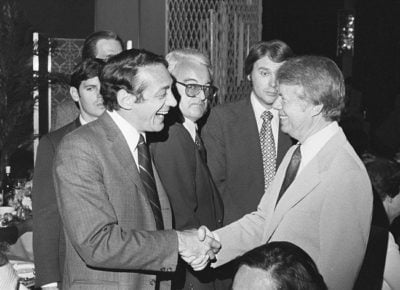Harvey Milk was the first LGBTQ elected public servant in California history. He spent less than a year in office, but left a legacy that helped change hearts and minds.
Monday was the 39th anniversary of Milk’s assassination.
COMING OUT
The man who would become known as the “Mayor of Castro Street,” initially was politically conservative — he campaigned for Republican presidential hopeful Barry Goldwater in 1964— and content to live a closeted life.
RELATED: Long Beach has nation’s first park named for Harvey Milk
POLITICAL BEGINNINGS
In 1972, Milk moved from New York City to the Golden State and opened a camera shop, Castro Camera, on Castro Street, the heart of San Francisco’s gay community. He ran for a seat on the San Francisco Board of Supervisors in 1973, but lost.
The following year, Milk co-founded the Castro Village Association to unite gay business owners, and launched the inaugural Castro Street Fair in 1974.
Milk also forged an alliance with the Teamsters Union by supporting a boycott of Coors beer, and the union returned the favor by promising to hire more gay drivers.
RELATED: LGBTQ leaders inducted into Harvey Milk Park
‘MAYOR OF CASTRO STREET’
Thanks to his charisma, enthusiasm, and political skills, Milk was soon called the “Mayor of Castro Street.”
After losing another bid for the Board of Supervisors in 1975, Milk was appointed by Mayor George Moscone to the Board of Permit Appeals, making him the first openly gay city commissioner in the nation. He left that post after running for the California State Assembly, but lost.

Harvey Milk, left, meets presidential candidate Jimmy Carter in this 1976 photo. Photo: Harvey Milk Foundation.
MAKING CHANGE
A short time later, Milk founded the San Francisco Gay Democratic Club and successfully pushed to reorganize the Board of Supervisors election from an at-large format to a district format.
Milk returned to campaigning in 1977. While gay rights was always a priority, Milk’s agenda also included affordable housing, public transportation, and daycare centers for working mothers.
RELATED: Gay rights pioneer Lee Glaze lead a pre-Stonewall rebellion in Los Angeles
HISTORIC ELECTION
The November election was historic. Milk became California’s first openly gay elected official. He represented the Haight-Ashbury and upper Market Street neighborhoods, where the city’s gay population emerged as a political force.
BANNING DISCRIMINATION
As supervisor, Milk spearheaded an ordinance to ban sexual orientation discrimination in employment, housing, and public accommodations. It was one of the nation’s strongest gay-rights measures.
The lone dissenting vote was Supervisor Dan White. Mayor Moscone signed the measure into law March 21, 1978.
BRIGGS’ INITIATIVE
That summer and fall, Milk spent a lot time campaigning against State Senator John Briggs’ Proposition 6 ballot initiative, which wanted to ban gay and lesbian teachers and anyone supporting gay rights from working in California schools. The anti-gay and lesbian initiative lost by more than 1 million votes.
On November 27, former Supervisor White, armed with a .38 revolver, went to San Francisco City Hall. White had resigned his position months earlier and had unsuccessfully asked to be reinstated.
MILK MURDERED, ‘TWINKIE DEFENSE’
Angered that he wasn’t returning to the board, White shot and murdered Moscone, then went to Milk’s office and fatally shot him.
Thousands of Milk supporters marched to city hall that night for a candlelight vigil.
At the trial, the defense argued that White had been under severe mental distress due to losing his job, citing his junk-food diet as evidence of low morale.
The strategy was ridiculed as the “Twinkie Defense,” but the jury apparently bought it. On May 21, 1979, White was sentenced to less than eight years in prison for voluntary manslaughter.
‘WHITE NIGHT RIOTS’
Milk supporters and the gay community were furious and took to the streets. Protesters stormed city hall and set police cars on fire, and the San Francisco police retaliated by smashing gay bars and beating patrons. The evening was dubbed the “White Night Riots.”
‘THE TIMES OF HARVEY MILK’
Milk’s story was told to a larger audience through Randy Shilts’s 1982 biography, “The Mayor of Castro Street,” and Rob Epstein’s 1984 Oscar-winning documentary, “The Times of Harvey Milk.”
MORE OFFICIALS COME OUT
At the same time, other elected officials, including Massachusetts Congressmen Gerry Studds and Barney Frank, came out of the closet.
Milk’s story made it to the silver screen in 2008 with Gus Van Sant’s acclaimed biography, “Milk.” Sean Penn won a best actor Oscar for his portrayal of Milk. Screenwriter Dustin Lance Black also won an Academy Award.
PRESIDENTIAL MEDAL OF FREEDOM
In 2009, Milk’s May 22 birthday was formally recognized in California as Harvey Milk Day, and he was honored with the nation’s highest civilian honor, the Presidential Medal of Freedom, by Barack Obama.
